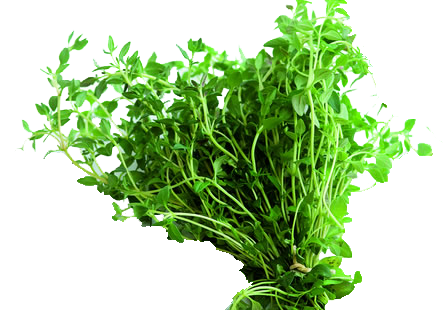|
Thyme contains
many active principles that are found to have disease preventing and health
promoting properties.
Thyme herb
contains thymol, one of the important essential oils, which scientifically have
been found to have antiseptic, anti-fungal characteristics. The other volatile
oils in thyme include carvacolo, borneol and geraniol.
Thyme contains
many flavonoid Phenolic antioxidants like zeaxanthin, lutein, pigenin,
naringenin, luteolin, and thymonin. Fresh thyme herb has one of the highest
antioxidant levels among herbs, a total ORAC (Oxygen Radical Absorbance
Capacity) value of 27426-umol TE/100 g.
Thyme is packed
with minerals and vitamins that are essential for optimum health. Its leaves
are one of the richest sources of potassium, iron, calcium, manganese,
magnesium, and selenium. Potassium is an important component of cell and body
fluids that helps controlling heart rate and blood pressure. Manganese is used
by the body as a co-factor for the antioxidant enzyme, superoxide dismutase.
Iron is required for red blood cell formation.
The herb is also
a rich source of many important vitamins such as B-complex vitamins, beta
carotene, vitamin A, vitamin K, vitamin E, vitamin C and folic acid.
Thyme provides
0.35 mg of vitamin B-6 or pyridoxine; furnishing about 27% of daily recommended
intake. Pyridoxine keeps up GABA (beneficial neurotransmitter in the brain)
levels in the brain, which has stress buster function.
Vitamin C helps
body develop resistance against infectious agents and scavenge harmful,
pro-inflammatory free radicals.
Vitamin A is a
fat soluble vitamin and antioxidant that is required maintaining healthy mucus
membranes and skin and is also essential for vision. Consumption of natural
foods rich in flavonoids like vitamin A and beta-carotene helps protect from
lung and oral cavity cancers.
Thyme leaves
offer significant levels of quality phyto-nutrients profile. Just 100 g of
fresh leaves provides (% of recommended daily allowance)
38% of
dietary fibre,
27% of
vitamin B-6 (pyridoxine),
266% of
vitamin C,
158% of
vitamin A,
218% of
iron,
40% of
calcium,
40% of
magnesium and
75% of
manganese
But no
cholesterol.
Anti-fungal Ability: The most famous active ingredient found in thyme is thymol.
This organic compound has a wide range of effects on the body, including the
ability to prevent fungal and viral infections, thereby reducing strain on the
immune system.
Antioxidant
Capacity: With one of the highest antioxidant
concentrations in any herb, thyme has been praised for thousands of years as an
overall health booster. The phenolic antioxidants found in thyme, including
lutein, zeaxanthin, and thymonin all contribute to neutralizing and eliminating
free radicals throughout the body. Free radicals are the dangerous by-products
of cellular metabolism that can do major damage to your healthy cells by
causing apoptosis or spontaneous mutation. These antioxidants help to prevent
oxidative stress in all of your organ systems, as well as your neural pathways,
heart, eyes, and skin.
Circulation: The high concentration of iron and other essential minerals in
thyme make it ideal for stimulating the production of red blood cells, thereby
boosting your body’s circulations and the oxygenation of essential organ
systems and extremities throughout the body.
Heart Health: The rich blend of antioxidants, minerals, and vitamins in thyme
have many small effects on the heart, but the potassium and manganese are
particularly important. Potassium is a vasodilator, meaning that it can reduce
the stress on the cardiovascular system by relaxing blood vessels and lowering
blood pressure. This can extend your life by preventing atherosclerosis and
avoiding strokes, heart attacks, and coronary heart disease.
Vision Booster: The concentration of carotenoids and vitamin A found in thyme
make it an effective antioxidant agent for your visions health. Carotenoids can
neutralize the free radicals in your ocular system and slow the onset of
macular degeneration and prevent cataracts!
Immune System: The high levels of vitamin C found in sage make it a natural
immune system booster. Vitamin C stimulates the production of white blood
cells, which are the first line of defence in the body’s immune system. Vitamin
C also plays a crucial part in the production of collagen, which is essential
for the creation and repair of cells, muscles, tissues, and blood vessels.
Reduce Stress: One of the vitamins in thyme (B6) has a powerful effect on
certain neurotransmitters in the brain that are directly linked to stress
hormones. Regular inclusion of thyme in your diet can help to boost your mood
and ease your mind when stressful thoughts come calling.
Respiratory Issues: One of the most well-known and long-standing uses for thyme in
traditional medicine is as a respiratory health agent. If you are suffering
from bronchitis, chronic asthma, congestion, colds, flus, blocked sinuses, or
seasonal allergies, thyme acts as an expectorant and an anti-inflammatory
substance, eliminating phlegm and mucus from the respiratory tracts, easing
inflammation to help breathing, and prevent microbial development that can lead
to illness. Brewing thyme leaves into a powerful tea is the best way to achieve
this sort of relief for respiratory ailments.
|

